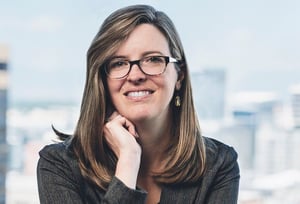She’s been named “power player of the year” by the Smart Electric Power Alliance, and one of the most powerful women of 2019 by the Colorado Women’s Chamber of Commerce. Now Alice Jackson, president of Xcel Energy -- Colorado, will be keynoting HERWorld Denver on March 8.

The event is part of the Pink Petro HERWorld Energy Forum, which will bring people together in Houston, Denver, London and online to address new frontiers in the energy industry.
Jackson’s speech comes shortly after Xcel made a big announcement: that it will cut carbon emissions 80% (from 2005 levels) by 2030 and achieve net-zero carbon by 2050.
After starting her career as an IT consultant, Jackson moved into the energy space, and rose to become a leader in a sector that still has far too few women at the top.
Pink Petro’s Josh Levs spoke with her about her role in Xcel’s big move, her unique career journey, and this year’s HERWorld theme, “shift.”
You were responsible for Colorado’s role in Xcel’s big announcement. What was that process like?
AJ: We’ve been hearing from customers and stakeholders that they want to “go green” as far as is reasonable from a reliability and cost perspective, without impacting when their lights are on and without breaking the bank. So there’s been a lot of conversation around renewables.
We’re fortunate that in Colorado we have great wind for wind power and lots of sunshine for solar power. But we also need to make sure that we have something dispatchable for when there isn’t enough wind or sun. We’ve been looking at this for a long time, examining our options and where the technology needs to be to continue to drive down prices.
We felt confident enough that we can set the target for 2050. And by putting that stake in the ground, we also incentivize people outside of our company to start working toward that end -- including the laboratories, the universities with research departments, and entrepreneurs who have ideas that could help in this transition. If we can get there before 2050, awesome!
Your career involved a big shift. How did you transition from IT to energy and rise to the top?
AJ: I ask too many darn questions, and I’m not bashful about it! It’s also about operating with high integrity and respect.
I started at Enron, and got laid off along with 3,000 other people my first year out of college. I was lucky to get picked up by Occidental Petroleum within two weeks. Then, someone sent an email to the IT group asking if one of us could help with a project. I took it on, and ended up programming an entire new system to disseminate information and bill customers. This meant learning all the rules, asking lots of questions, offering new ideas, and speaking with people higher and higher in the organization. They ended up asking me to come and run the business side. My career just kept growing from there.
What advice do you have for other people looking to advance?
AJ: Read a lot. Not just things pertaining to your space and interests. Read everything. You never know when those dots will connect in your head, when you’ll need to have a conversation with someone else. And being able to pull together all that different information will help give you the bigger picture.
I ask men this too, not just women: How do you balance work and parenthood?
My husband was my high school sweetheart. We have four sons. I used to travel a lot when I was based in Texas, and that was rough. The opportunity to travel less was one of the things that drew me to Colorado.
I find that it’s about intentionality. At times I have my work hat on, and at other times my mom hat. Our family is incredibly close. We love spending time with each other, and we know that time is valuable.
My husband has been fabulous. We respect the value that each of us has brought to the relationship. He’s a stay-at-home dad and has a contract with a company he has been with for many years, working about 20-30 hours a week out of the house. He takes ownership of making sure our boys are where they need to be. He’s also been baseball coach, den leader, those kinds of things. Our youngest son is five this year, so my husband is going back into the workplace this fall.
If I don’t have work that’s absolutely necessary, I go home between 5 and 5:30. I cook dinner, and we sit down. That doesn’t mean I don’t take out the computer after the boys are asleep, or after staying up late helping my oldest prepare for his chemistry test!
Recently I got a call at home about a major event at work. My husband made sure the car had gas, got me coffee while I was getting ready to rush into work, and even called my administrator to say, “It’s going to be a rough day -- make sure she gets food.”
We’re setting good examples for our children, showing them a way to make life work. At the end of day, all six of us are happy. That’s what it comes down to.
Hear more from Alice Jackson at HERWorld Denver.



